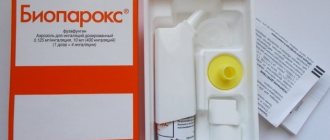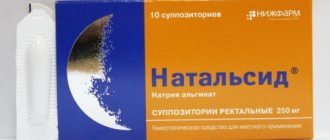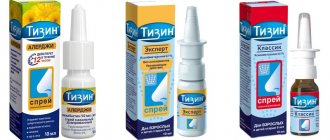During pregnancy, due to a decrease in the functioning of the immune system, women often catch a cold or “catch” a virus, which is accompanied by severe inflammation of the nasal mucosa, that is, a runny nose. In addition, a frequent companion to pregnancy is vasomotor rhinitis, which occurs against the background of hormonal changes.
Regardless of the cause of the disease, swelling of the mucous membranes requires treatment, since breathing through the mouth threatens oxygen starvation for the mother and fetus, and also facilitates the easy spread of infection through the respiratory tract. To solve this problem, doctors prescribe various nasal remedies for rhinitis with antimicrobial, vasoconstrictor and antiallergic effects. One of these drugs is Vibrocil. Is it allowed to be used during pregnancy, what properties does it have and what side effects should we expect?
Can Vibrocil be used during pregnancy?
Nasal congestion can occur for various reasons. In most cases, a runny nose is bacterial or viral. Girls and women experience such unpleasant symptoms as severe cough, general malaise, and fever. There are times when a woman feels healthy, but her nose cannot breathe. The reason for this phenomenon is the intense production of progesterone, which contributes to excessive drying of the nasal mucosa.
The doctor diagnoses vasomotor rhinitis, the symptoms of which disappear on their own after childbirth. When a girl inhales air through her mouth, her lungs are not fully supplied with oxygen. If homeopathic medicines do not bring a positive result, then pregnant women are prescribed the use of the drug Vibrocil. It effectively constricts blood vessels and is not contraindicated during pregnancy.
The official package insert states that scientists have not conducted studies on the effects of active substances (dimentindene and phenylephrine) during pregnancy and breastfeeding. For this reason, they cannot confirm or deny the fact of teratogenic effects on the fetus. Pregnant girls are not recommended to use vasoconstrictor drugs.
This is due to the fact that when the drug gets on the nasal mucosa, it is quickly absorbed into the general bloodstream, and therefore can negatively affect the condition of the placenta. Doctors prescribe the use of Vibrocil drops in the second trimester in minimal dosages. The drug does not affect the condition of the mother and the development of the fetus.
When is it prescribed?
Many people believe that a runny nose is a harmless symptom of a cold that does not require special treatment, but this is far from the case, especially during pregnancy. A runny nose or rhinitis not only causes discomfort, but can also have a negative effect on the fetus. An untreated or prolonged runny nose can cause:
- sinusitis;
- frontal sinusitis;
- throat diseases;
- fetal hypoxia or fetoplacental insufficiency, due to a lack of oxygen supply to the fetus.
To prevent such complications and eliminate the symptoms of rhinitis, the doctor may prescribe Vibrocil. The main indications for its use are:
- rhinitis of viral or allergic origin;
- sinusitis;
- complex therapy of acute otitis;
- vasomotor rhinitis.
Vibrocil belongs to the category of symptomatic drugs. Its use will help cope with the symptoms of a runny nose during acute respiratory viral infections, acute respiratory infections, eliminate nasal congestion, and reduce the amount of mucus secreted. Indications for use may be preparation for abdominal surgery in the nose or in the postoperative period to eliminate swelling of the nasal mucosa.
Video: Treatment of allergic rhinitis during pregnancy
What does it contain?
Vibrocil belongs to a prohibited group of drugs that are not recommended for use during pregnancy. But it may be prescribed if the potential threat to the mother’s health outweighs the risks to the fetus. Some health care professionals may consider using this medication during pregnancy on a case-by-case basis.
The composition contains two main components - phenylephrine and dimethindene. They help reduce the intensity of the allergic reaction and block the secretion of muconasal secretions. The drug has a mild vasoconstrictor and antiallergic effect. It is often prescribed for the effective treatment of inflammatory processes on the nasal mucosa that arise as a result of a cold or viral infection. Vibrocil drops during pregnancy block the symptoms of a runny nose, which occurs as a result of an allergic reaction.
Dimetindene is a substance whose action is aimed at blocking the active production of histamine receptors. This reduces the intensity of allergy symptoms. In patients, swelling and inflammation of the nasal mucosa decreases, vascular permeability improves.
Phenylephrine is an active element that stimulates the functioning of vascular adrenergic receptors. They are located in the nasal mucosa. When using drugs based on this substance, there is no disruption of local blood circulation. The active component has a pronounced vasoconstrictor effect and stimulates the internal space of blood vessels. In patients, swelling is relieved, and clinical manifestations that arise as a result of a cold are reduced.
Vibrocil drops are not used in the first trimester of pregnancy, when the process of formation and complete maturation of the placenta occurs. In the second and subsequent trimester, the use of the drug is considered strictly on an individual basis. It is prescribed to restore the health of pregnant girls who have been diagnosed with a long and painful runny nose. Untimely and ineffective treatment can lead to the progression of more serious diseases that may pose a potential threat to the development of the fetus.
How can I replace Vibrocil?
Analogues of Vibrocil are drugs with vasoconstrictor action. The problem is that many of them are prohibited during pregnancy, as stated in medical guidelines. However, your doctor may prescribe a vasoconstrictor later in pregnancy if the benefit outweighs the risk to the fetus.
In addition to such conditionally approved medications, the table also shows absolutely safe medications for the treatment of runny nose of various origins. Pregnant women should pay attention to natural preparations consisting of herbal ingredients or containing sea water.
In any case, the choice of a nasal agent, as well as its replacement, should be made only by the attending physician.
Table: nasal decongestants that a doctor can prescribe for an expectant mother
| Name | Release forms | Active components | Indications | Contraindications | Features of use during pregnancy |
| Tizin Xylo |
| Tetrizoline hydrochloride |
|
| Taking vasoconstrictors is dangerous during pregnancy. The question of use is decided by the doctor. |
| Otrivin | Xylometazoline hydrochloride |
|
| ||
| Naphthyzin | Naphazoline |
|
| ||
| Nazivin | Oxymetazoline hydrochloride |
|
| ||
| Pinosol |
|
|
|
| No limits |
| Aqua Maris |
| Sea water with natural trace elements |
| Component intolerance | |
| Salin | Spray | Isotonic aqueous sodium chloride solution |
|
|
Photo gallery: drops and sprays for runny nose prescribed for pregnant women
Tizin Xylo - vasoconstrictor drops for runny nose, rhinitis, sinusitis and sinusitis
Salin - saline spray for rinsing the nose
Pinosol is a natural drug used in the treatment of chronic and acute runny nose.
Otrivin is a vasoconstrictor for topical use in otorhinolaryngology.
Naphthyzin facilitates nasal breathing, reducing blood flow to the sinuses, has a local anti-inflammatory and anti-edematous effect
Nazivin is a drug in the form of nasal drops or spray, which has a pronounced decongestant and vasoconstrictor effect.
Aqua Maris is a drug that is used for the treatment and prevention of inflammatory diseases of the nasal mucosa
Folk remedies
In some cases, folk recipes also help with nasal congestion. Of course, you should not experiment with medicinal plants without consulting a doctor, since during pregnancy there is a high probability of negative consequences. If you have a runny nose over the weekend and a trip to the doctor is postponed, the following well-known remedies will come to the rescue:
- salt water, which moisturizes the mucous membranes and cleanses the sinuses (5 g of salt per 1 liter of boiled water);
- chamomile infusion, which helps with acute respiratory infections, which is accompanied by a runny nose (with allergic rhinitis it can be dangerous, with “runny nose of pregnant women” it is useless).
Contraindications
Pregnancy is not the only contraindication to the use of Vibrocil drops. It should not be used if the following health problems exist:
- renal failure;
- cardiovascular diseases;
- rhinitis;
- diabetes;
- thyroid diseases;
- arterial hypertension.
Vibrocil drops must not be used simultaneously with other medications that contain biologically active substances (monoamine oxidase enzyme inhibitors).
Children's nasal drops Vibrocil: how long can you drip for serious illnesses
Vibrocil drops are approved for adults and children. But pregnant women should not use them for a long time. In any case, if the recommended course of treatment is exceeded, unpleasant moments may occur (the nasal mucosa is damaged). For serious diseases (allergic sinusitis, chronic rhinitis, acute rhinitis of infectious origin), the course of treatment will be slightly longer than usual. Basically it is 9-10 days. If the runny nose does not go away over these days, then the drops are not suitable and the treatment tactics need to be changed.
Vibrocil is a combination drug that has a vasoconstrictor effect. Pregnant women should use any medicine with caution to avoid harm to the unborn baby.
Dosage form of Vibrocil
The drug Vibrocil is available in several forms that can be used during pregnancy after consultation with your doctor:
- Drops. This is a safe form of the drug. Vibrocil nasal drops can be prescribed to children under one year of age. Before use, it is necessary to thoroughly clear the nasal sinuses of mucus accumulation. Drops are instilled while standing, lying down or sitting into each nasal opening. For maximum results, you need to wait until the product is evenly distributed throughout the nasal sinuses.
- Spray. This drug is prescribed to patients who have been diagnosed with an acute form of rhinitis in early pregnancy or while breastfeeding a baby. It should only be used in extremely rare cases. The drug should not be prescribed to children under six years of age. The spray is used after complete cleansing of the nasal sinuses.
- Gel. This is an effective nasal remedy that has a distinct lavender aroma. It is prescribed to girls in the second trimester of pregnancy or during lactation (after individual consultation with the attending physician).
Undesirable effects of Vibrocil for mother and child
Vibrocil during pregnancy can cause an increase in blood pressure. This can trigger a number of undesirable consequences, such as:
- Placental abruption. It can cause intrauterine fetal death. Due to placental abruption, a woman may develop hemorrhagic shock, which without timely assistance can be fatal due to internal bleeding.
- Increased uterine tone. Due to the development of hypertension, miscarriage, premature birth and intrauterine fetal death are possible.
- Disturbance in the supply of nutrients and oxygen to the fetus. All this can cause dysfunction of the child’s internal organs, primarily affecting the central nervous system. Due to oxygen deficiency, intrauterine death of the fetus is possible; it may develop cerebral edema, kidney failure, and cardiovascular pathologies. Hypoxia can cause asphyxia of the newborn, secondary immunodeficiencies, and intracranial birth trauma.
Due to high blood pressure, there is a high risk of stroke or death of a woman during childbirth.
In addition, with increasing pregnancy due to the growing uterus and doubling of blood volume, the load on the kidneys increases. And treatment with Vibrocil during pregnancy can lead to a surge in pressure and fluid accumulation, which can cause kidney failure.
There are many reviews on the Internet that women took Vibrocil during pregnancy. The drug relieved nasal congestion well and restored breathing. At the same time, Vibrocil did not have a negative effect on the course of pregnancy and the health of the child.
Instructions for use
The form of the drug Vibrocil during pregnancy is selected in each individual case strictly individually. The doctor may prescribe the medicine in the form of drops, spray or gel. This drug has a high degree of effectiveness, so pregnant girls are prescribed it in a minimal dosage.
In the absence of contraindications, the duration of taking the drug cannot exceed more than one week. It may have an addictive effect. For pregnant women, the duration of use is reduced to four days. It is necessary to bury the nasal sinuses only during the daytime or to relieve the condition before going to bed.
Pregnant girls are advised to buy the product in the form of drops to eliminate the possibility of an overdose. It is important to remember that if relief does not occur during use of the product, then it is strictly forbidden to independently increase the indicated dosage. In this case, you need to consult a doctor who can replace the drug.
Reviews from women
At first I buried it before going to bed. There was an effect, but it wasn’t enough for the whole night, so I had to instill it again. Afterwards I slept well. Having felt the effect of the spray, I began to instill it in case of nasal congestion, not only at night, but also during the day. I suffered from rhinitis throughout my pregnancy. The spray helped somehow. After the birth of the child, everything went away the next day.
olinka https://otzovik.com/review_799873.html
It’s not advisable, although they are for children, they are vasoconstrictors, but during my first pregnancy I suffered from nasal congestion and therefore used them from time to time.
Svetlana Erofeeva https://www.baby.ru/blogs/post/343205896–328060297/
When I first became pregnant, I began to experience what I now know is pregnancy rhinitis, a fairly common occurrence. And, to be honest, I was saved only by vasoconstrictor drops, although I knew about their harm, I couldn’t do anything, because I wanted to breathe so bad, but I couldn’t even breathe through my nose, it was always blocked. Seeing this, a doctor friend recommended Vibrocil to me, saying that it still has a weak vasoconstrictor effect and is not so harmful to a young pregnant body. I felt better before my eyes, and after a week I completely stopped taking any drops.
tjanyshka https://irecommend.ru/content/nakhodka-dlya-beremennykh-i-grudnichkov
I consider Vibrocil to be a fairly mild remedy in terms of harm to the body; it can be used for children and is recommended during pregnancy, although the instructions say that it is not allowed. When I got sick and was in the fourth month of pregnancy, I dripped Vibrocil into my nose, told my doctor about it, she didn’t say anything against it, and in principle there were no consequences, you just can’t drip it for more than 5 days, then you should change the remedy for the runny nose, if Vibrocil does not help.
Alonka https://spasibovsem.ru/responses/spas-ot-nasmorka-v-beremennost-horosh-dlya-detej-pomogaet-pri-allergii.html
They prescribed it for drips at 26 weeks, they said, if not more than 5 days, it’s ok! And washing with Dolphin helps me, it is harmless. <…> But if it doesn’t get better within 5 days, I would advise going to an ENT specialist to get cuckoos done!
girl_paint https://ru-perinatal.livejournal.com/25713650.html
Overdose
Below are the most likely overdose symptoms that may occur in pregnant girls:
- the heartbeat begins to accelerate;
- pain intensifies in the occipital region;
- dizzy;
- tremor of the limbs;
- excited state;
- the skin becomes pale;
- insomnia, restless sleep;
- general malaise;
- a sharp increase in pressure;
- vomiting and nausea;
- abdominal cramps.
To improve the condition, you need to drink activated charcoal and drink more fluids. In case of overdose, you must urgently call an ambulance.
pharmachologic effect
Thanks to its composition, Vibrocil has a complex effect and is effective in situations where other vasoconstrictor drugs are powerless. Pharmacological properties of the drug:
- Vasoconstrictor. The drug is indispensable for seasonal illnesses (acute respiratory infections and colds), during which the patient often suffers from a runny nose and nasal congestion (we recommend reading: what drops can pregnant women use for nasal congestion?).
- Antiallergic. A common symptom of allergies is a runny nose, accompanied by severe itching in the sinuses. If conventional vasoconstrictor medications do not help, Vibrocil will quickly eliminate symptoms and relieve itching.
- The anticongestive effect is expressed in reducing the swelling of the mucous membrane and quickly relieving swelling.
Analogs
The drug Vibrocil has several equally effective analogues with a similar effect. It is strictly forbidden to independently select analogues. You can replace Vibrocil with the following drugs:
- Eden Reno;
- Grippocitron Rhinos;
- Alergomax;
- Milt.
Every pregnant girl should understand the full responsibility for her health, so if you notice the first signs of a cold or chronic runny nose, you should seek help from a doctor. Only a qualified specialist will be able to correctly prescribe treatment based on the diagnostic results obtained. The drug Vibrocil contains two active components that help cope with the cause of rhinitis and eliminate unpleasant symptoms.
Composition and release forms of the drug
The main active ingredient of the drug is phenylephrine, which effectively and quickly relieves swelling by constricting blood vessels, and because of which, the drug is prohibited during pregnancy.
The second active component of Vibrocil is dimentidine, which relieves itching, copious mucus secretion and significantly reduces the urge to sneeze. This is essentially an anti-allergenic agent, which allows the drug to be used for runny noses and sinusitis of any etiology.
The drug is available in the form of a spray, drops and gel. All three forms are equally potentially dangerous, since one of the active substances tends to penetrate the placental barrier, while the other acts on all blood vessels.
Treatment regimen for pregnant women and dosage (drops, spray, gel)
Therapy during pregnancy is similar to the standard treatment regimen, the dosage is determined by the form of the drug:
- Drops. Drop 3-4 drops into each nasal passage at a time, three times a day. The recommended position for instillation is sitting, with the head tilted back. You must remain in this position for some time after the drops have been instilled.
- Spray. Apply injections four times a day, 1-2 in each nasal passage. The procedure is best done while sitting. The tip is inserted into the nose, pressing is done and the sprayed particles are inhaled.
- Gel. Used for applications (3-4 times a day). It is recommended to do the last application at night.
Any of the release forms cannot be used for more than 5-7 days. There is no children's version of the drug that would be safe for pregnant women. For children, the daily and single dosage is simply reduced.










